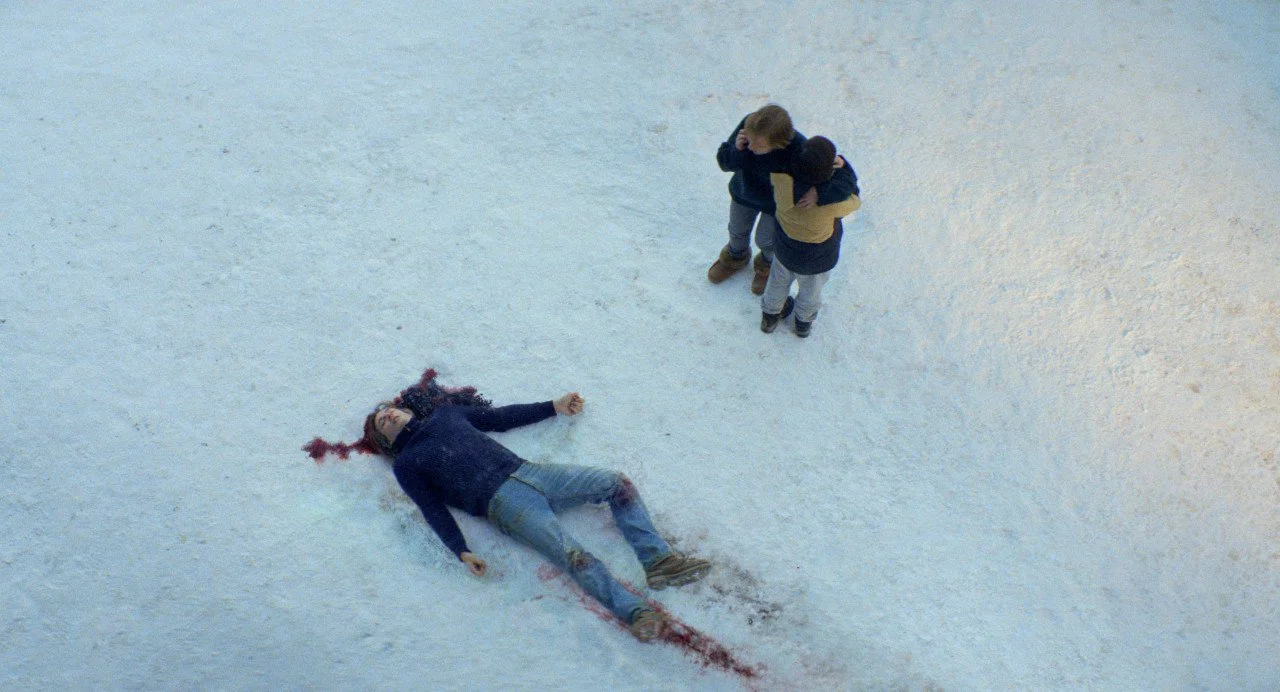Anatomy of a Fall: Did He Jump or Did She Push?
By Liam Lacey
Rating: A
Justine Triet’s Anatomy of a Fall, which was awarded the Palme d’Or at Cannes this past May, isn’t your conventional, well-made legal thriller. The plot, which follows trial of woman novelist accused of shoving her husband out the window of their alpine chalet, is content to leave the viewer in twisted strands of ambiguity.
Also, the accused protagonist of the story is intelligent, balanced, plausible, and even candid about her reasons for lying when doing so. She’s played by the German actress Sandra Hüller (Tony Erdmann, the upcoming Holocaust drama, The Zone of Interest) as an ambitious woman, both shrewd and guileless, who is unapologetic about her needs. Hüller’s performance, the anchor of the film, does nothing that panders or asks for sympathy. You have to decide whether she’s ruthlessly honest or, possibly, just ruthless.
The film begins when an attractive grad student, Zoé (Camille Rutherford) arrives at a chalet in the French Alps to interview Sandra Voyter (Hüller), a fortyish German-born writer who lives with her French husband Samuel and their 11-year-old son, Daniel (Milo Machado Graner). Zoé asks Sandra about the fusion of autobiography and fiction in her books. Sandra, sipping wine, is evasive but also flirtatious, turning questions back on the interviewer.
The interview is interrupted by a blast of steelpan music, an instrumental version of 50 Cent’s 2003 hit, “P.I.M.P,” making further conversation impossible. Sandra explains that the offender is her husband up in the attic. She suggests they continue the interview later in Grenoble and the student leaves.
Meanwhile, Daniel, who is blind from a childhood accident, takes his border collie Snoop for a walk in the snow. When he returns, he and the dog discover his father’s corpse on the ground, with a gash on his head and blood spattered around him. The boy screams and his mother comes outside, checks the body, and phones for an ambulance.
The police arrive. Shortly after, Sandra is arrested as a suspect, and the film’s style moves from a domestic drama toward a more fractured documentary style, including media reports of the trial. As the sole support of her disabled son — the only possible witness to the case — Sandra is allowed to stay in her own house, with a court chaperone.
The judge insists that Sandra speak only French, so the chaperone will know if she attempts to coach her son’s testimony. The ruling makes life awkward: Daniel has been raised speaking English as his first language, a compromise between his French father and German mother. Sandra is also not allowed to speak her native German in court.
The trial proceeds chaotically, French-style, which means that the judge directly interrogates the witnesses and the accused as she wishes. There are gruesome re-enactments with dummies banging their heads off a shed, DNA evidence, analysis of blood splatters, with contradictory expert testimonies. A condescending prosecutor (Antoine Reinartz) interrogates the student interviewer, Zoé, suggesting Sandra was attempting to seduce her. He even introduces Sandra’s novels as evidence of her state of mind.
Sandra’s lawyer is an old flame, Vincent (Swann Arlaud) who warns the jury about the danger of fantasizing scenarios on partial evidence. “An author is not her characters,” he objects. This is all about stories and perceptions to him. He pointedly sidesteps her question about whether he believes her to be innocent. Complicating matters, the only sort of witness is Sandra’s blind son, Daniel, who has his own motives for what he chooses to remember and forget.
The emotional peak of the film comes not with the announcement of the verdict at the end, but some critical chunk of evidence that’s presented around the film’s two-third mark. It comes in the form of a flashback, accompanied by an audio tape of an angry argument between Sandra and Samuel which took place the day before Samuel’s death.
Samuel, it seems, has been taping moments of his domestic life, possibly as fodder for his own auto-fiction he was trying to write. Because Samuel knew the tape was running, it adds the possibility that he was choreographing the argument to prove a point. The argument is as fiery as the rest of the film is chilly, a molten stream of resentment, including his feeling that Sandra blames him for their child’s accident, to Sandra’s subsequent unfaithfulness, to her borrowing one of his narrative ideas for her own book.
Worst of all, in the public perception, is her refusal to assuage his feelings, which she regards as tiresome self-pity. The upshot is that he has laid the evidence that she’s not a supportive wife. Will a conviction for murder be such a stretch?
As an intelligent, adult examination of a marriage gone sour, wrapped up in the trappings of a legal thriller, Anatomy of a Fall is original and engaging, though perhaps not so profound an investigation into truth as some of its advocates have claimed.
“Must we enter into a literary debate?” asks one of the lawyers in the trial. Well, obviously, because the essence of a trial is a competition between more or less credible narratives.
Anatomy of a Fall. Directed by Justine Triet. Written by Justine Triet and Arthur Harari. Starring Sandra Hüller, Milo Machado Graner, Samuel Theis, Swann Arlaud, Antoine Reinartz and Camille Rutherford. In select theatres October 20.



